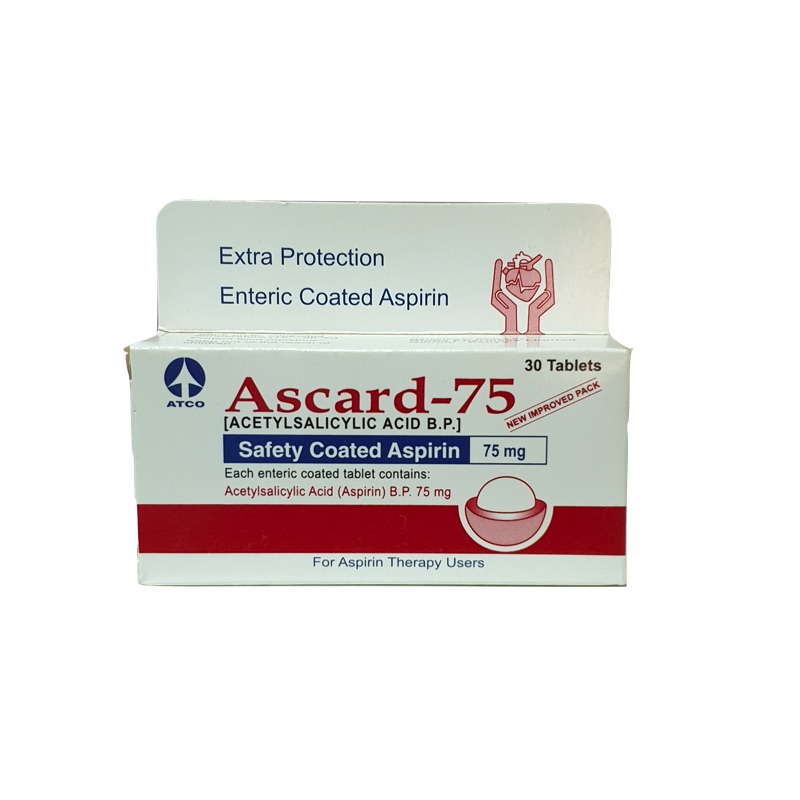ASCARD 75 mg (Acetyl Salicylic Acid Enteric-Coated Tablets) is a low-dose oral medication formulated to provide effective cardiovascular protection. Each enteric-coated tablet contains 75 mg of Acetyl Salicylic Acid (commonly known as Aspirin), a nonsteroidal anti-inflammatory drug (NSAID) that inhibits platelet aggregation, thereby reducing the risk of blood clots. ASCARD 75 mg is primarily prescribed for the prevention of myocardial infarction (heart attack), ischemic stroke, and other thrombotic events in individuals with a history of cardiovascular diseases or those at high risk. Its enteric-coated formulation ensures that the tablet dissolves in the intestines rather than the stomach, minimizing gastrointestinal irritation and enhancing patient compliance.
Key Features and Benefits:
- Low-Dose Cardiovascular Protection: Each tablet contains 75 mg of Acetyl Salicylic Acid, optimized for inhibiting platelet aggregation without the higher doses associated with pain relief or anti-inflammatory effects.
- Enteric-Coated Formulation: The enteric coating allows the tablet to pass through the stomach intact, dissolving in the intestines to reduce the risk of gastrointestinal side effects such as irritation, ulcers, and bleeding.
- Prevents Blood Clots: Acetyl Salicylic Acid effectively inhibits the formation of blood clots by blocking the enzyme cyclooxygenase (COX), which plays a crucial role in platelet aggregation.
- Reduces Risk of Heart Attack and Stroke: Regular use of ASCARD 75 mg in individuals with cardiovascular risk factors significantly lowers the likelihood of experiencing myocardial infarction and ischemic stroke.
- Proven Efficacy: Extensive clinical research supports the use of low-dose Aspirin in reducing the incidence of recurrent cardiovascular events in patients with established heart disease.
- Convenient Oral Administration: Easily incorporated into daily routines, enhancing adherence to long-term preventive therapy.
- Minimal Sedative Effects: Unlike some other medications, ASCARD 75 mg does not cause drowsiness, allowing individuals to maintain their daily activities without impairment.
Usage Instructions:
- Dosage:
- Adults: Typically, the recommended dosage is one ASCARD 75 mg tablet taken once daily.
- Children: Use in children is generally not recommended unless specifically prescribed by a healthcare professional for particular medical conditions.
- Administration:
- Swallow the enteric-coated tablet whole with a sufficient amount of water.
- It is advisable to take ASCARD 75 mg with food or immediately after a meal to further minimize potential gastrointestinal discomfort.
- Frequency:
- Once Daily: Maintain a consistent daily schedule to ensure continuous platelet inhibition and optimal cardiovascular protection.
- Duration of Use:
- Long-Term Therapy: ASCARD 75 mg is intended for long-term use as a preventive measure against cardiovascular events. Do not discontinue use without consulting your healthcare provider, even if you feel well.
Precautions:
- Consult a Healthcare Provider: Always use ASCARD 75 mg under the supervision of a qualified healthcare professional to ensure it is appropriate for your specific health condition and to determine the correct dosage.
- Allergic Reactions: Discontinue use and seek immediate medical attention if you experience signs of an allergic reaction, such as rash, itching, swelling, severe dizziness, or difficulty breathing.
- Gastrointestinal Conditions: Use with caution in individuals with a history of peptic ulcers, gastrointestinal bleeding, or other significant gastrointestinal disorders.
- Bleeding Disorders: ASCARD 75 mg can increase the risk of bleeding. Inform your healthcare provider if you have any bleeding disorders or are taking other medications that affect blood clotting.
- Surgery and Dental Procedures: Inform your surgeon or dentist that you are taking ASCARD 75 mg prior to any surgical or dental procedures to manage bleeding risks appropriately.
- Pregnancy and Breastfeeding: Consult your healthcare provider before using ASCARD 75 mg if you are pregnant, planning to become pregnant, or breastfeeding, as Aspirin may have adverse effects on fetal development and lactation.
- Kidney and Liver Function: Individuals with impaired kidney or liver function should use ASCARD 75 mg with caution and under medical supervision, as Aspirin is metabolized in the liver and excreted by the kidneys.
Possible Side Effects:
- Common Side Effects:
- Mild gastrointestinal discomfort, such as nausea or indigestion.
- Heartburn or acid reflux.
- Dizziness or lightheadedness.
- Less Common Side Effects:
- Rash or itching.
- Tinnitus (ringing in the ears) at higher doses.
- Easy bruising or bleeding gums.
- Serious Side Effects (Seek Medical Attention Immediately):
- Signs of gastrointestinal bleeding, including black or tarry stools, vomiting blood, or severe abdominal pain.
- Severe allergic reactions, such as hives, difficulty breathing, or swelling of the face, lips, tongue, or throat.
- Signs of kidney dysfunction, such as decreased urine output, swelling in the legs, or unexplained weight gain.
- Reye’s syndrome in children and teenagers recovering from viral infections (use in individuals under 18 years of age is generally contraindicated unless prescribed by a healthcare provider).
Storage Instructions:
- Temperature: Store ASCARD 75 mg tablets at room temperature, between 15°C to 30°C (59°F to 86°F), away from direct sunlight and moisture to maintain their efficacy.
- Accessibility: Keep the medication out of reach of children to prevent accidental ingestion.
- Packaging Integrity: Ensure that the bottle is tightly closed after each use to protect the tablets from environmental factors and maintain their shelf life.
- Expiration: Do not use the tablets beyond the expiration date indicated on the packaging. Discard any unused medication after this date.


